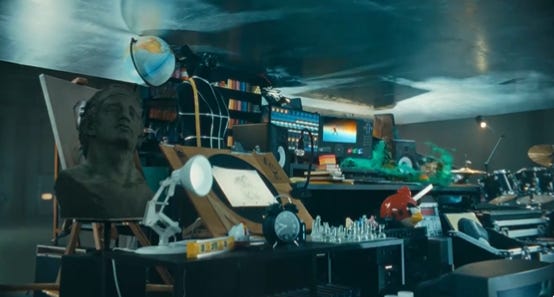How Apple totally lost the plot
The new ad showing the destruction of analog culture to sell iPads is an amazing failure to read the room by a company that used to know better.
Not since Kendall Jenner slipped away from a modeling shoot to defuse the tensions around a Black Lives Matter protest by handing a can of Pepsi to a riot cop has a mainstream ad campaign generated as much hostility as the just-released spot from Apple pitching the arrival of the thinnest iPad ever.
The ad was shared on Twitter by Apple CEO Tim Cook, who implored potential customers to “Just imagine all the things it’ll be used to create." The clip shows a huge hydraulic press slowly crushing a bunch of old analog-era creative tools and treats, including a trumpet, an acoustic guitar and a piano, a record player, a camera, an old stand up arcade game, some rubber squeeze toys, and a bunch of paint cans. Then it pulls up to reveal the new, ultra thin iPad Pro, which has assimilated all of these things like some flatland Borg.
You can see what Apple was going for here – all these old, bulky, single purpose tools and playthings are now available at your fingertips, in a package no bigger than a magazine. It’s an upgraded version of that old meme that used to go around about everything that used to be literally on your desktop – phone, typewriter, file folders, fax machine, and so on – is now digitally sitting there on your computer desktop.
People got it all right. The response to the spot was immediate, visceral, and vicious. They hate it.
How did Apple go so wrong?
The most salient feature of the western mind’s relationship with technology is the ambivalence we have felt ever since Prometheus stole fire from the gods. On the one hand, we can now cook our food and keep ourselves warm. On the other hand, who knows where this will lead? Have we unleashed forces that will lead us to our destruction, or at least, lead us away from our true, authentic, selves? We love technology but we fear it, and the pendulum tends to swing from one extreme to the other depending on a host of factors, the most important of which is probably the rate of change and innovation. The faster things move, the less time we have to adapt, and we fear what is being lost more than we appreciate what is being gained.
We are living through a period of what is for most of us unprecedented technological change, where the threats – to both humanity, and to our humanity – seem more urgent than they have in decades, certainly since the advent of the nuclear bomb. Whether it is the sudden fears over AI or the rising moral panic over smartphones or the leery way we look at self-driving cars, there is a firm sense that things are just happening too fast, that the old is being replaced by the new in ways we are barely able to process, let alone control.
This is something that Apple used to understand implicitly, going back to the famous “Big Brother” Super Bowl spot from 1984, filmed by Ridley Scott. In that ad, legions of drone-like workers are arranged in orderly rows, watching a giant screen where Big Brother appears to give an address celebrating the anniversary of the “Information Purification Directives” that have created a society of pure ideological conformity. Everything is black and white, until a blonde woman wearing bright red suddenly appears, running toward the screen being chased by riot police. She screams, then throws a huge sledgehammer at the screen, which explodes in a flash of light. Thanks to the new Macintosh from the Apple Computer Corporation, we are informed, 1984 will not be like 1984.
At one level, this ad is the purest rebel sell – the ideology of rebellion and non-conformity being used to pitch a high-priced consumer product. And sure, it is a bit silly to suggest that an effective way of asserting your individuality is to use a non-standard operating system. But what Apple was able to do with the Macintosh was deliver on one of the most difficult tricks of mass production, by making its users feel that their individuality was being enhanced by the product, not smothered by it. And so it has been ever since. For decades now, but especially since the introduction of the iPod, Apple has managed to convince its customers that its products are an example of the liberating power of technology – not liberating us from our flesh, but liberating our flesh from centralized control. Apple’s great success was making us feel more human, not less so.
Which is what makes Apple’s decision to introduce a new product by showing beloved tools of the analog world literally getting crushed so baffling. First, it completely undermines what has been one of the most successful unique selling propositions of any brand in history. But more to the point, it utterly fails to notice where the current debate over technology is trending. School boards everywhere are taking steps to ban phones not just in class, but anywhere on school grounds. Even the people who are making AI are pleading with governments to regulate AI. Culturally, there is a rising fascination with the tools and techniques and products of the old analog world, not only amongst jaded Gen Xers, but also amongst their Gen Z offspring who are starting to wonder what the world was like in the Before Times. Gen X nostalgia is everywhere.
It wouldn’t have taken much to save the spot. As one person noted in a comment under Tim Cook’s Twitter (X) post, the whole thing would have worked perfectly if the ad were simply played in reverse: Instead of the tools of the increasingly-lost analog world being crushed into the iPad, they expand out of it.
Any successful technology has to be seen as amplifying or expanding our basic humanity, not subsuming it or replacing it. For the company that gave us the “Big Brother” ad to go full 1984 is a remarkable failure of self-understanding, and an even more amazing failure to simply read the room.
Steve Albini died this week, at 61. I don’t have much to add that hasn’t been written – the man was a genius, and did as much to shape the music of the 90s as just about anyone. But if you are looking for something fun, read his four page proposal to Nirvana to produce In Utero. Or just listen to In Utero. Meanwhile, Welcome new readers! Thanks for joining us; please share this with anyone you think might enjoy it. See you in the comments. ap




The problem with current tech is it's obsessed with efficiency for things that aren't enhanced by "efficiency". Creating is a wonderfully human act -- at times tedious and frustrating and sublime and satisfying. It needs time and space and patience. We tend to associate the tools with the process, so our love for creating rubs off a little on your guitar or keyboard or pen or desk or whatever. It's an emotional connection.
Implying we can make that better via replacement with an iPad just doesn't get the joy or creating the way earlier Apple ads ("Think Different") did. The iPad is a new tool to add to the toolbox, not the one tool to replace them all.
It's telling that this does mirror the desktop meme, which focuses more on office work, where cost and efficiency rule. That's the wrong vibe for creative endeavors, though.
Whoever greenlit that ad should be launched into the Sun... with that ad on repeat ::>_<::